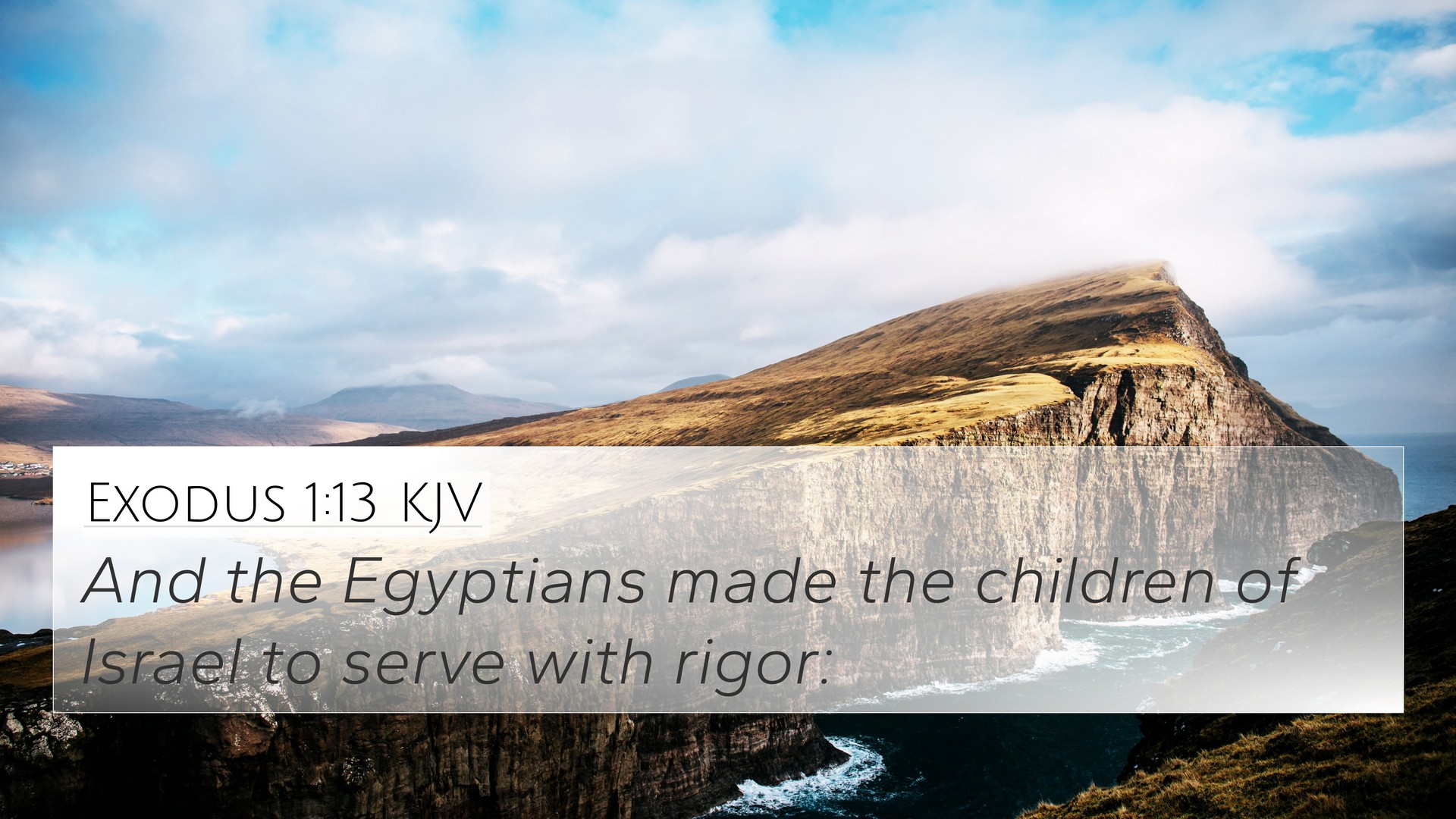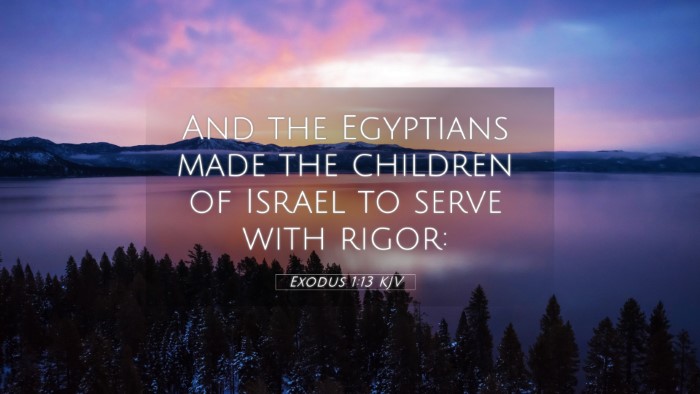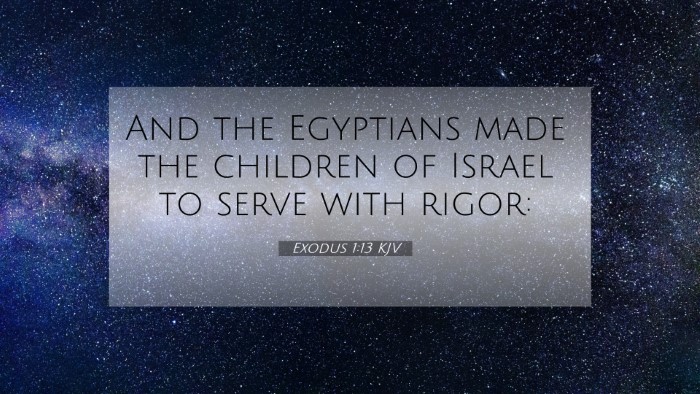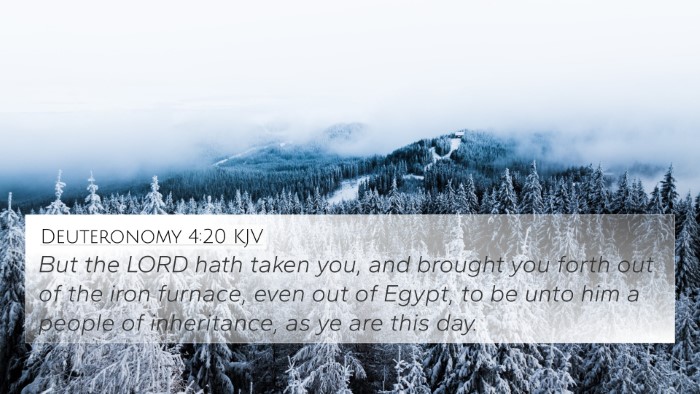Understanding Exodus 1:13
Exodus 1:13 states, "And the Egyptians made the children of Israel to serve with rigor." This verse encapsulates a significant moment in the history of Israel's oppression in Egypt, highlighting themes of suffering, resilience, and the providence of God. Below is a detailed summary of insights drawn from various public domain commentaries.
Summary of Insights
-
Matthew Henry's Commentary:
Henry emphasizes the harsh treatment of the Israelites, illustrating the Egyptian oppression as a direct consequence of their growing numbers and influence. This rigorous service reflects the fear of the Egyptians, who believed that the Israelites could rise against them, highlighting the need for God’s deliverance for His people. The use of the term "rigor" signifies not only physical labor but also emotional and spiritual anguish.
-
Albert Barnes' Notes:
Barnes notes that the Israelites were subjected to hard bondage, indicating an effort to break their spirit. The manner of this enslavement was systematic and brutal, designed to overwhelm and subjugate them. He correlates this scenario with historical patterns of oppression and suggests that such adversities often precede significant divine intervention.
-
Adam Clarke's Commentary:
Clarke discusses the sociopolitical climate of Egypt during this period. He proposes that the fears of Pharaoh led to oppressive policies that not only affected the Israelites but also indicated the moral bankruptcy of Egyptian society. Clarke emphasizes that the treatment of the Israelites serves as a pivotal backdrop for understanding the forthcoming deliverance through Moses.
Cross-References to Exodus 1:13
Exodus 1:13 is interwoven with several other Bible verses that enhance understanding through thematic connections and parallels. Here are some significant cross-references:
- Genesis 15:13: God foretold Abraham that his descendants would be strangers in a land that is not theirs and would be enslaved there.
- Exodus 3:7-10: God hears the cries of the Israelites and prepares to deliver them from their oppression.
- Psalm 105:25: The Lord turned the Egyptians against the Israelites, highlighting God's sovereignty over the oppressor.
- Deuteronomy 26:6-8: Refers to the Israelites' enslavement and God's mighty hand which led them out of Egypt.
- Acts 7:19: Stephen recounts the oppression of the Israelites in Egypt, highlighting their suffering.
- Hebrews 11:24-26: Focuses on Moses choosing to be mistreated with his people rather than enjoy the fleeting pleasures of sin, reflecting the deep significance of their struggles.
- Revelation 11:8: Symbolically depicts the spiritual condition of Egypt, equating it with oppression and rebellion against God.
Thematic Connections
This verse illustrates important themes throughout the Bible, including:
- Oppression and Deliverance: Many biblical narratives echo the plight of the Israelites under slavery and God's faithfulness to deliver His people.
- God's Sovereignty: The events unfolding in Exodus highlight God's control over history, demonstrating that oppression cannot thwart God’s purpose.
- Faith amidst Suffering: The plight of the Israelites serves as a reminder of the importance of faith and trust in God during difficult times.
- The Promise of Redemption: Similar to the oppression of the Israelites, other Biblical instances also highlight the theme of eventual deliverance and restoration.
Inter-Biblical Dialogue
Understanding Exodus 1:13 involves recognizing connections between different scripture passages, creating a dialogue across the biblical narrative. This verse not only marks an essential moment in Israel's history but also foreshadows the greater salvation narrative seen through events leading to Christ. Notably, themes of suffering, redemption, and God's faithfulness resonate in both the Old and New Testaments.
Tools for Further Study
For those interested in exploring these connections further, several tools and methods can be employed:
- Bible Concordance: Helps locate key words in scripture to discover cross-references.
- Bible Cross-Reference Guide: Offers structured references to similar themes across the text.
- Cross-Reference Bible Study Techniques: Encourage systematic study of related passages to deepen understanding.
- Bible Reference Resources: Various dictionaries and commentaries provide insights and context.
Conclusion
Exodus 1:13 serves as a critical verse in understanding the historical and theological context of suffering faced by the Israelites. The oppression they endured underscores the faithfulness of God and establishes a framework for future redemption narratives throughout the Bible. By utilizing cross-references and thematic connections, readers can gain a richer understanding of scripture and its implications for faith and resilience in times of difficulty.



